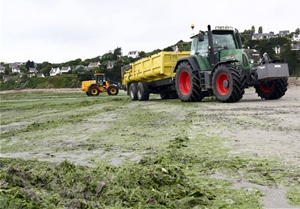 Fears in Brittany over the health risks of toxic seaweed have been re-ignited after two wild boar were found dead on a beach and the amount of the foul-smelling green algae collected from western French shores has doubled in a year.
Fears in Brittany over the health risks of toxic seaweed have been re-ignited after two wild boar were found dead on a beach and the amount of the foul-smelling green algae collected from western French shores has doubled in a year.
Conservationists say that toxic seaweed has now spread to more than 200 sites along the Atlantic coast from southern Brittany to the beaches of Normandy.
Bays popular with Britons from La Baule, a top summer beach destination in southern Brittany, to Granville in the Cotentin are now struggling to dispose of thousands of tons of Ulva lactuca – more commonly known as sea lettuce.
Experts have warned that the algae poses a health risk as when it rots it produces hydrogen sylphide, which if trapped under a seaweed crust and suddenly released can prove as deadly as cyanide.
Anses, the French Agency for Food, Environmental and Occupational Health and Safety, has just issued guidelines for dealing with the green sludge, saying it must be picked up within 48 hours of reaching the beach before it can start producing gas. If not, in the worst cases, it can cause “loss of consciousness with cardiac arrest or coma”.
The seaweed has been multiplying abnormally fast due to the use of huge amounts of nitrates in intensive pig and poultry farming that seep into the region’s rivers and water tables and end up in the sea.
“This year, all the conditions have come together for a growth in green algae,” said Alain Ménesquen, expert from the state marine laboratory Ifremer. “The sun and warmth of May have allowed them to carry out photosynthesis, then the June rains brought all the nitrates they need to develop.”
By the end of June, some 25,000 square metres of seaweed had been collected from the beaches of Brittany, twice as much as the previous year.
The worst affected area is Saint-Brieuc in the Côtes-d’Armor coast of Brittany, where around half of all the seaweed is washed up.
Earlier this month, two wild boar were found dead on the beach at Saint-Maurice in Morieux. The beach has been barricaded off ever since, with local authorities saying they had detected dangerous pockets of gas linked to seaweed deposits.
Read the rest of this article at: Telegraph.co.uk | by: Henry Samuel in Paris